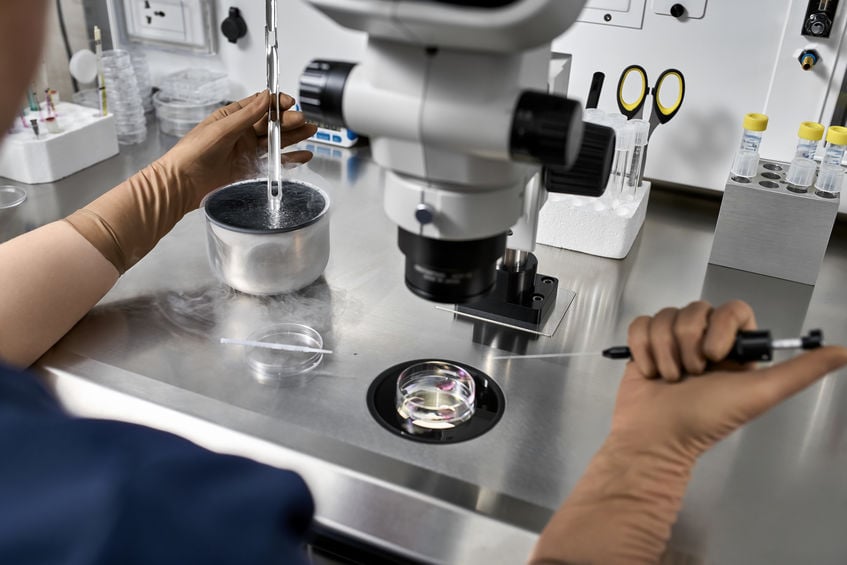IVF With PGT
Preimplantation genetic testing (PGT) is when the genetic material (chromosomes) of an embryo is analyzed before the embryo being transferred to the uterus. There are different types of genetic testing that can be done. PGT for monogenic disorders, known as PGT-M, is used to look for a specific disease when one or both of partners are known to be carriers of an inherited genetic disorder.
PGT for aneuploidy (PGT-A), formerly referred to as PGS, is considered for women who have experienced recurrent pregnancy losses, for women of advanced age, for identifying genetic normality prior to embryo transfer or to determine an embryo’s sex (male or female). The term aneuploidy refers to having an abnormal amount of genetic material and is the leading cause of miscarriage and unsuccessful embryo implantation in the uterus. The goal of PGT-A is to identify chromosomally normal embryos which can then be selected for transfer, significantly increasing the chance of pregnancy.
For PGT cases, eggs are fertilized via intracytoplasmic sperm injection (ICSI) to create embryos. After 5-6 days of growth, cells from the outer portion of embryo are sampled and the embryo is then cryopreserved. The risk of damaging an embryo from the biopsy is approximately 1%. The embryo(s) remain at our clinic and the samples are sent to a reference lab for analysis. Results are obtained in approximately one week. Once results are available, a plan is made for the next step, which is usually a frozen embryo transfer (FET) in the next menstrual cycle. PGT may increase the likelihood of having a healthy baby.
IVF With Donor Egg
For women who, for any reason, cannot or should not use their own eggs, donor eggs are an excellent solution. Fertility treatment with donor eggs has a high rate of success. RMIA uses both known and unidentified donors, as well as fresh and frozen eggs. RMIA has its own frozen donor egg bank, and we also work with several approved outside egg banks to obtain eggs from donors who have already undergone the screening, monitoring and retrieval process. Thus, frozen donor eggs are ready to use. We also offer a warranty program for qualified patients using RMIA’s egg bank. The RMIA donor egg warranty program includes up to 3 cycles of IVF using our donor eggs, including all embryo transfers, until you achieve a successful birth or, if you are not successful, you will receive a refundable portion of the program cost.
IVF With Gestational Carrier
IVF with a gestational carrier is an option for patients who are unable to carry their own pregnancy. Embryos may be created from either the patient’s own eggs or donor eggs and then are transferred to the uterus of the gestational carrier to achieve an ongoing pregnancy.
Embryo Donation
As an alternative to IVF with donor egg or traditional living child adoption, patients may be able to receive embryo(s) donated by other patients. Donated embryos are typically those that remain in cryostorage after the biological parents have completed their family. Additional testing of the biological parents (sperm/egg sources) may be required prior to embryo transfer. Legal agreements and/or psychological counseling may be required prior to embryo transfer.
Embryo donation is considered on a case-by-case basis. RMIA does not maintain a repository of available donated embryos.
Frozen Embryo Transfer
A frozen embryo transfer (FET) refers to the placement, after thaw, of a previously frozen (cryopreserved) embryo into the uterus. Frozen embryos allow patients an opportunity to achieve pregnancy without undergoing another round of ovarian stimulation and egg retrieval.
Embryos may remain frozen indefinitely and are usually transferred during a cycle in which the uterine lining has been prepared using both estrogen and progesterone. For women with normal periods, performing a transfer in a natural cycle – at the time an embryo would implant in a spontaneous conception – may be an option. Greater than 95% of embryos survive cryopreservation and the thawing process. With the modern cryopreservation techniques, frozen embryo transfers have a similar rate of success as fresh embryo transfers.





